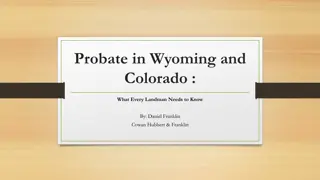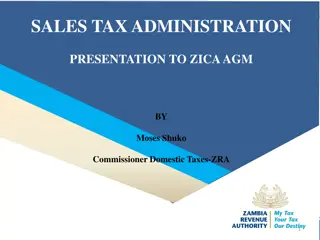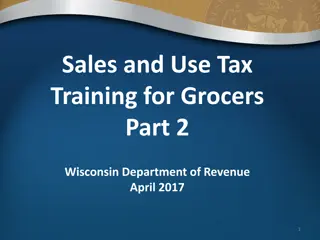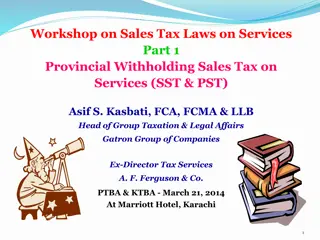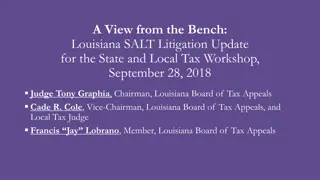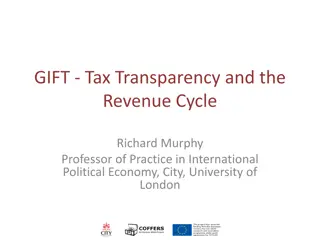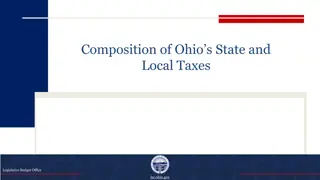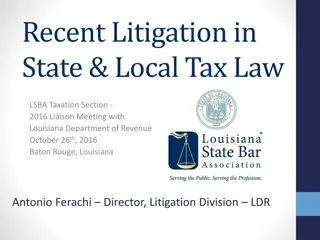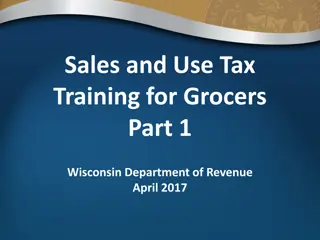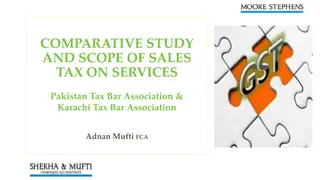Insights into Wyoming Tax Sales: Cases and Strategies
Discover the mechanics and legal nuances of tax sales through the Anadarko v. Family Tree case in Wyoming. Explore the historical policies, statutory provisions, and key rulings that shape tax sales in the state, along with practical practice points for legal professionals. Uncover the essential aspects and exclusions in tax assessment laws and litigation strategies.
Download Presentation

Please find below an Image/Link to download the presentation.
The content on the website is provided AS IS for your information and personal use only. It may not be sold, licensed, or shared on other websites without obtaining consent from the author. Download presentation by click this link. If you encounter any issues during the download, it is possible that the publisher has removed the file from their server.
E N D
Presentation Transcript
WYOMING TAX SALES: INCEPTION THROUGH ANADARKO V. FAMILY TREE
GOALS FOR PRESENTATION 1. 1.Mechanics of tax sales Mechanics of tax sales 2. 2.Anadarko v. Family Tree Anadarko v. Family Tree case 3. 3.Practice points Practice points case
WHAT IS NOT COVERED (AMONG OTHER ISSUES) 1. 1. Exhaustive review of Wyoming tax assessment, tax Exhaustive review of Wyoming tax assessment, tax sale or tax deed law sale or tax deed law 2. 2. Comprehensive review of applicable statutes Comprehensive review of applicable statutes Redemption, Taxpayer remedies Notice requirements 3. 3. Litigation strategies Litigation strategies
ROADMAP OF PRESENTATION I. I. Wyoming case law & statutory mechanics of Wyoming case law & statutory mechanics of tax sale/tax deeds tax sale/tax deeds II. II. Facts of Family Tree Facts of Family Tree III. III.District court s holding District court s holding IV. IV.Arguments of the litigants Arguments of the litigants V. V.Discussion of case/Holding Discussion of case/Holding VI. VI.Potential practice points Potential practice points
HISTORICAL POLICIES BEHIND TAX SALES A A rule rule of of primary execution execution of of a a tax the the statute statute Black, Tax Titles, Section 208. Black, Tax Titles, Section 208. primary importance importance is, tax deed deed must must conform is, that strictly to to that the the conform strictly
HISTORIC WYOMING CASE LAW Statutory Statutory provision must must be be literally, complied complied with owners owners. . Barlow v. Lonabaugh Barlow v. Lonabaugh, 156 P.2d 289 (Wyo. 1945) , 156 P.2d 289 (Wyo. 1945) provision prerequisite prerequisite to to a a tax literally, or or at at least with [because] [because] the tax title title least substantially, substantially, the law law favors favors the the
WYOMING CASE LAW (CONTD.) Knowing Knowing that uncertain, uncertain, and numerous numerous contingencies, contingencies, he in in the the speculation speculation and having having his his title title be Board of County Com rs v. Brewer, Board of County Com rs v. Brewer, 62 P.2d 685 (Wyo. 1936) (quoting (quoting American Investment Co. v. Beadle County American Investment Co. v. Beadle County, 5 S.D. 410) that tax and that are to to some usually depend he engages engages his and assumes assumes the be worthless worthless 62 P.2d 685 (Wyo. 1936) tax titles titles are that they they usually some extent depend on his means means the liability liability of of extent on , 5 S.D. 410)
STRICT COMPLIANCE Historically, Historically, Grantees successors successors- -in in- -interest, risks risks associated associated with inconsistencies inconsistencies in in assessment Grantees under interest, take with failures assessment. . under a a tax take vast failures in in form, tax sale, sale, or or their vast majority majority of of the form, and their the and
HISTORIC/STRICT CASE LAW A tax deed may be set aside even after it has been of record over five years, where it shows upon its face that the certificate was assigned by the county for considerably less than the amount then required for redemption. Logsdon Logsdon v v. . Hodges Hodges, , 114 114 P P. . 854 854 (Kan (Kan. . 1911 Tax deed not acknowledged by clerk of the district court, as required by statute, void on its face. Matthews Matthews v v. . Blake Blake, , 92 92 P P. . 242 242 (Wyo (Wyo. . 1907 1911) ). . 1907) ). .
HISTORIC/STRICT CASE LAW This Court has held on many occasions that a tax deed issued without strict compliance with the statutory requirements as to the service of the notice of the expiration of the period of redemption is void. Wittrock Wittrock v v. . Weisz Weisz, , 73 73 N N. .W W. .2 2d d 355 355 (N (N. .D D. . 1955 1955) ). . The title to be made under a tax deed is stricti juris. All the requirements of the statute must be clearly and strictly complied with. Bailey Bailey v v. . Smith Smith, , 52 52 N N. .E E. . 948 948 (Ill (Ill. . 1899 1899) ). .
HISTORIC/STRICT GENERAL RULES I. Extraordinary event II. Rigorous requirements to ensure fairness III.Interpretation in favor of owner that lost property IV.Risk is on the purchaser at tax sale
2 HURDLES TO OVERCOME 1. 1. Tax assessment/sale was legal and Tax assessment/sale was legal and constitutional constitutional 2. 2. Tax deed conforms to statute Tax deed conforms to statute
Imperfect, Imperfect, but potentially effective potentially effective but Perfect, Perfect, above reproach once beyond reproach once beyond redemption redemption above Never effective Never effective TAX Illegal or Unconstitutional Legal/Constitutional ASSESSMENT ????? ????? DEED FORM Improper ????? ????? Proper, Valid on Face
DEED: VOID OR FAIR ON ITS FACE Tax deed not acknowledged by clerk of the district court, as required by statute, void void on on its its face face. Matthews Matthews v v. . Blake Blake, , 92 92 P P. . 242 242 (Wyo (Wyo. . 1907 1907) ). . Where the statute directs the execution of a deed by a public officer and requires it to be executed in a particular manner and to be witnessed or acknowledged before a particular officer, the witnessing or acknowledging of the deed in that manner is a part of its execution, and without such witnessing or acknowledgment is void void upon upon its Matthews v. Blake Matthews v. Blake, 16 Wyo. 116, 92 P. 242 (1907) , 16 Wyo. 116, 92 P. 242 (1907) its face face.
DEED: VOID OR FAIR ON ITS FACE 1913 tax deed failed to recite required notice was nonetheless held to be fair fair on on its its face face. North North American American Realty Realty Co Co. . v v. . Brady Brady, , 77 77 Colo Colo. . 56 56, , 234 234 P P. . 1054 1054 ( (1925 1925) ). . In neighboring jurisdictions, a tax deed which is fair on its face, but nonetheless contains improprieties, will require extrinsic evidence to prove those improprieties could be fatal.
ASSESSMENT: VOID OR VOIDABLE Taxes assessed in an incorrect name, deemed void. McCarthy v. Union Pac. Ry. Co. McCarthy v. Union Pac. Ry. Co., 131 P.2d 326 (Wyo. 1942). , 131 P.2d 326 (Wyo. 1942). Failing to notify property owner resulted in void tax deed. Thompson Thompson- -Green v. Estate Drobish Green v. Estate Drobish, 2006 WY 126. , 2006 WY 126. A voidable assessment is an assessment which is made in good faith but is irregular or unfair. Hackney v. McKenny Hackney v. McKenny, 151 So. 524 (Fla. 1933) , 151 So. 524 (Fla. 1933).
VOID VOID VOIDABLE VOIDABLE Imperfect, Imperfect, but potentially effective potentially effective Perfect, Perfect, above reproach once beyond reproach once beyond redemption redemption (Possession req.) (Possession req.) above Never effective Never effective but TAX Strictly Illegal or Unconstitutional Void Void Non Non- -fatal fatal error error Legal/Constitutional ASSESSMENT Voidable Voidable DEED FORM Void on its Face Fair on its Face Fair on its Face, or better
WHY DO WE CARE? Void deed is wholly ineffective to pass title. Wayt Wayt v v. . Urbigkit Urbigkit, , 152 152 P P. .3 3d d 1057 The special statute of limitations runs only upon a sale regularly made under the forms of law Matthews Matthews v v. . Blake Blake, , 92 92 P P. . 242 242 (Wyo (Wyo. . 1907 1907) ). . A tax deed, void on its face, will not set statute of limitations in motion. Denny Denny v v. . Stevens Stevens, , 75 75 P P. .2 2d d 378 378 (Wyo (Wyo. . 1937 1937) ). . The question then is, does possession under a tax deed, void upon its face, start the running of the six years' statute of limitations? We are of the opinion that this question must be answered in the negative. Matthews Matthews v v. . Blake Blake, , 16 16 Wyo Wyo. . 116 116, , 92 92 P P. . 242 242 ( (1907 1057 (Wyo (Wyo. . 2007 2007) ). . 1907) ). .
WHY DO WE CARE? (CONTD.) Voidable" operative to convey until set aside by a court. A voidable deed is capable of being either avoided or confirmed. Void" deed is legally invalid for any purpose whatsoever. The recording of a void deed is legally insufficient to create a legal title and affords no protection to those claiming under it. See See 23 23 Am Am. .Jur Jur. .2 2d d Deeds Deeds 163 163. .
WYO. TAX SALES/TAX DEEDS I. I. W. S. W. S. 39 W. S. 39-13-108 39- -13 13- -101 101 - - Assessment/Taxation Assessment/Taxation II. II. W. S. W. S. 34 34- -2 2- -131 through 135 131 through 135 Tax Deeds Tax Deeds
W. S. 39-13-101, ET SEQ.: AD VALOREM TAXATION ** W. S. ** W. S. 39 latest legislative session. Several changes take latest legislative session. Several changes take effect July 1, 2017. effect July 1, 2017. 39- -13 13- -101 , et seq. were amended in 101 , et seq. were amended in
W. S. 39-13-108 ENFORCEMENT OF AD VALOREM TAXATION (e)(ii) Tax sales of real property (e)(ii) Tax sales of real property (e)(iii) Process if property remains unsold (e)(iii) Process if property remains unsold (e)(iv) (A) Following four (4) years from the date of (e)(iv) (A) Following four (4) years from the date of sale the county treasurer shall issue and record a sale the county treasurer shall issue and record a tax deed tax deed
W. S. 39-13-108 ENFORCEMENT OF AD VALOREM TAXATION (e)(vii)(B) Any grantee of a tax deed or county commissioner's deed are entitled to possession of the real property conveyed by the deed and the deed is prima prima facie facie evidence evidence of of title described subject to special assessments for local or public improvements. The burden be be upon upon any any party party seeking seeking to to invalidate conveyed by a tax or county commissioner's deed title to the property burden of of proof invalidate title proof shall shall title
W. S. 39-13-108 ENFORCEMENT OF AD VALOREM TAXATION (e)(vii)(D) No action for the recovery of real property sold for the nonpayment of taxes shall be maintained unless unless commenced commenced within years years after after the the date date of of sale sale for within six six ( (6 6) ) for taxes taxes. .
WYOMING TAX DEEDS In In 1975 1975, , the Wyoming Wyoming law through through 134 the Wyoming Wyoming legislature law into into Wyo Wyo. . Stat 134. . legislature codified Stat. . Ann Ann. . 34 codified 34- -2 2- -131 131
W.S. 34-2-131 TAX DEEDS Defines: Tax deed Former owner Grantee Possession
W.S. 34-2-132 TAX DEEDS: TWO YEAR LIMITATION & POSSESSION (a) No action, suit or other proceeding shall be commenced by the former owner to set aside, declare declare invalid invalid or or redeem forfeiture, foreclosure or other proceeding upon which it is based or to recover possession, quiet title or otherwise litigate or contest the title of the grantee, if: (i) Two Two ( (2 2) ) years years or or more more have have elapsed the the deed deed in the office of the county clerk for the county in which the real estate described in the deed is situated; and (ii) The grantee has been in possession continuously continuously for for a a period period of of at at least after after one one ( (1 1) ) year year and and six six ( (6 6) ) months of recording of the tax deed. redeem from from a a tax tax deed deed or or the the sale sale, elapsed after after the the date date of of recording recording possession of of the least six six ( (6 6) ) months, months have elapsed since the date the real real estate estate any time months, at at any time
W.S. 34-2-132 TAX DEEDS: TWO YEAR LIMITATION & POSSESSION (CONTD.) (b) The limitation in subsection (a) of this section applies regardless of whether the tax deed or any of the proceedings upon which it is based are void void or or voidable voidable for any reason, jurisdictional or otherwise. If the deed is executed executed substantially prescribed prescribed for for the the execution execution of of tax tax deeds, regardless regardless of of whether whether the the deed deed is is deemed deemed void substantially in in the deeds, the the limitation limitation shall void upon upon its the form shall apply its face face. form apply
W.S. 34-2-133 TAX DEEDS: POSSESSION Possession by the grantee for a continuous period of not less than six (6) months at any time after one (1) year and six (6) months have elapsed since the date of recording recording the forever forever all all the the claims, claims, right, right, title title and and interest possession, of the former owner, and vests in the grantee any title conveyed or purportedly conveyed by the tax deed. Proof possession possession by by the the grantee grantee and and the the record conclusive conclusive evidence evidence of of the the legality legality and and and any any proceedings proceedings upon upon which which the the deed of of the the grantee grantee. the tax interest, , including the right to tax deed deed extinguishes extinguishes Proof of of constitutes the deed and of of the the title record of of the and effectiveness effectiveness of of the deed is is based, based, and the tax tax deed deed constitutes deed title
W.S. 34-2-134 TAX DEEDS: LIBERAL CONSTRUCTION This act shall be liberally purpose purpose of of giving giving stability and clarifying the titles of persons in possession, of providing a means of correcting procedural and jurisdictional defects without necessity of resort to further proceedings, and of rendering tax titles marketable and protecting purchasers thereof against remote claims. liberally construed construed to to effectuate stability and and effect effect to to record effectuate the record titles titles, of confirming the legislative legislative
PRACTICE POINT Even Even though though W W. .S S. . 34 enacted enacted to to codify codify Wyoming tax tax deed deed interpretation, interpretation, statutes/constitution statutes/constitution at at the sale sale and and deed deed to to determine 131 through through 135 case law law regarding must must determine determine the time time of of assessment, assessment, determine what what was 34- -2 2- -131 135 Wyoming case regarding was required required. .
UPDATED GENERAL POLICIES I. I. Extraordinary event Extraordinary event II. II. Rigorous requirements to ensure fairness Rigorous requirements to ensure fairness III. III. Interpretations in favor of person that lost Interpretations in favor of person that lost their property their property IV. IV. MOST risks on the purchaser at tax sale? MOST risks on the purchaser at tax sale?
VOID AND VOIDABLE i. i. Void Void on Never a conveyance of property, statute of limitations never run ii. ii. Fair Fair on on face/Voidable face/Voidable Statute of limitations run, illegality must be challenged timely on face/Void face/Void
ANADARKO LAND CORP. V. FAMILY TREE CORP., 2017 WY 24
ANADARKO LAND CORP. V. FAMILY TREE CORP. 1901 1901 Patent Patent from conveying conveying Section Wyoming Wyoming. . 1911 Laramie Laramie County 1912 1912 Laramie Laramie County 1914 1914 UPRC UPRC conveyed 1919 1919 Iowa Iowa Land Laramie Laramie County 1949 1949 Commissioner s Commissioner s Deed from USA Section 7 7, , T T14 USA to to Union 14N, Union Pacific N, R R65 65W, Pacific Railroad W, 6 6th th, , P P. .M M. ., , Laramie Railroad Company, Laramie County, Company, County, 1911 County assessed assessed in in- -place County attempted attempted sale, conveyed surface surface of of Section Land & & Livestock Livestock purchased County Deed recorded place minerals, minerals, remained sale, no no bidders bidders Section 7 7 to to Iowa Iowa Land purchased mineral mineral estate remained unpaid unpaid Land & & Livestock Livestock estate from from recorded in in Laramie Laramie County County
FACTS OF FAMILY TREE (CONTD.) 1971 1971 UPRC UPRC conveyed conveyed all Pacific Pacific Land Land Resources 2000 Union Union Pacific Pacific Land RME RME Land Land Corp 2000 2000 RME RME Land Land Corp Sisters, Sisters, LLC Livestock) Livestock) wherein Section Section 7 7 2002 2002 RME RME Land Land Corp 2010 2010 Family Family Tree Section Section 7 7 from all right, right, title Resources Corporation Corporation Land Resources Resources Corporation Corp. . Corp. . entered entered into into Settlement LLC (claiming (claiming to to be wherein each each party party was title and and interest interest in in Section Section 7 7 to to Union Union 2000 Corporation changed changed its its name name to to Settlement Agreement be a a successor successor of of Iowa was vested vested mineral Agreement with Iowa Land mineral interest with Three Three Land & & interest in in Corp. . changed changed its Tree Corp Corp. . acquired from successor successor of of Iowa its name name to to Anadarko acquired a a portion portion of of the Iowa Land Land & & Livestock Anadarko Land the minerals minerals beneath Livestock Land Corp Corp. . beneath
LARAMIE COUNTY DISTRICT COURT June 24, 2014 June 24, 2014 Family Tree filed quiet title action against Family Tree filed quiet title action against Anadarko and Three Sisters Anadarko and Three Sisters Argued Settlement Agreement was void and was a cloud on its mineral interest in Section 7 Anadarko (and Three Sisters) countered 1911 tax assessment Anadarko (and Three Sisters) countered 1911 tax assessment was unconstitutional and invalid was unconstitutional and invalid Family Tree responded by arguing assessment was valid, and Family Tree responded by arguing assessment was valid, and Anadarko was barred by the six Anadarko was barred by the six- -year statute of limitations year statute of limitations
RULING OF THE DISTRICT COURT Quieted title in Family Tree Quieted title in Family Tree Found tax assessment was valid Found tax assessment was valid UPRC forfeited its right to redeem or recover property UPRC forfeited its right to redeem or recover property Found Settlement Agreement a cloud on title Found Settlement Agreement a cloud on title Anadarko and Three Sisters appealed Anadarko and Three Sisters appealed
ISSUE ON APPEAL The The sole Laramie Laramie County's the the resulting resulting tax question question is is pivotal deed deed is is a a nullity, ineffective ineffective to to set sole question question Anadarko County's 1912 tax deed pivotal in in resolving nullity, making set a a statute Anadarko has 1912 tax tax sale deed were were void resolving this making it it ineffective statute of of limitations limitations running has presented presented on sale of of the the Section void ab ab initio this title title dispute ineffective to to transfer running. . on appeal appeal is is whether Section 7 7 minerals minerals and initio. . The The answer answer to to this dispute because because a a void transfer title whether and this void and title and Anadarko Land Corp. v. Family Tree Corp. Anadarko Land Corp. v. Family Tree Corp., 2017 WY 24, 389 P.3d 1218 (2017) , 2017 WY 24, 389 P.3d 1218 (2017)
ANADARKOS ARGUMENTS ON APPEAL 1. 1. Wyoming Wyoming Constitution to to allow allow taxation taxation of of unproduced 2. 2. Wyoming Wyoming case case law 3. 3. Neither Neither statute statute of of limitations, property property saves saves Family Constitution and and applicable applicable statutes unproduced minerals minerals law recognized recognized illegality illegality limitations, nor Family Tree s Tree s claim claim statutes failed failed nor after after- -acquired acquired
ASSESSMENT NOT ALLOWED BY STATUTE OR STATE S CONSTITUTION Wyo. Const. Article 15, Wyo. Const. Article 15, 3 (1910): Taxation and Revenue 3 (1910): Taxation and Revenue Mines Mines Taxation of Taxation of All mines and mining claims from which gold, silver and other precious metals, soda, saline, coal, mineral oil or other valuable deposit, is is or or may may be be produced produced shall shall be surface improvements, and in lieu of taxes on the lands, on the gross product thereof, as may be prescribed by law; provided, that the product of all mines shall be taxed in proportion to the value thereof. be taxed taxed in addition to the
ASSESSMENT NOT ALLOWED BY STATUTE OR STATE S CONSTITUTION Chapter 164. Mines Chapter 164. Mines- -Taxation, Taxation, 2449 (1910 Wyo. Compiled Stat.) 2449 (1910 Wyo. Compiled Stat.) Return Return for product of all mines and mining claims from which gold, silver and other precious metals, soda, saline, coal, coal, mineral mineral oil, is, or may hereafter be produced, while the same are being worked or operated, but but not not while while the the same same are are simply shall be returned by the owner, owners, lessee or operator thereof for assessment for taxation, assessed for taxation and taxed in the manner provided for in this chapter, and such tax shall be in addition to any tax which may be assessed upon the surface improvements of such mines or mining claims, and in in lieu lieu of of taxes taxes upon the the same same are are being being worked worked or or operated operated. for assessment assessment. . In proportion to the value thereof the gross oil, or or other other valuable valuable deposit deposit simply in in course course of of development development, upon the the land land of of such such claims claims while while
MILLIRON: ILLEGALITY OF TAXATION OF IN-PLACE MINERALS IN WYOMING It should be kept in mind that under the provisions of 32-1001, Wyoming Complied Statutes, 1945, the mineral interest on or under the lands is only subject subject to to assessment assessment when when and are are produced produced. Hence, any such property in minerals is not made subject to assessment for taxation, until their their actual actual production production. only made made such minerals minerals and as as such until Milliron Oil Company v. Connaghan Milliron Oil Company v. Connaghan, 302 P.2d 256 (Wyo. 1956). , 302 P.2d 256 (Wyo. 1956).
MILLIRON: ILLEGALITY OF TAXATION OF IN-PLACE MINERALS IN WYOMING This is made even more clear by 32-1003, W.C.S. 1945, which concerns the valuation of that class of property. That section provides that the valuation of the minerals are when when they they are are actually actually produced produced. This being the case it is clear that in the circumstances of this case where the mineral estate has been severed from the surface estate, the mineral estate has not as yet become subject to any assessment for taxation. In the absence of any such assessment, there could have been no delinquency and, consequently, no against against the the property property. are to to be be made made only only no valid valid sale sale for for unpaid unpaid taxes taxes Milliron Oil Company v. Connaghan Milliron Oil Company v. Connaghan, 302 P.2d 256 (Wyo. 1956). , 302 P.2d 256 (Wyo. 1956).
ANADARKOS ARGUMENT: MILLIRON CASE Oct Oct. . 1913 1913 - - Hillberry Hillberry contracted contracted to to purchase Merrill, Merrill, Merrill Merrill turned turned over lands lands to to Hillberry, Hillberry, but Apparently, Apparently, Hillberry Hillberry assumed along along with with the the surface surface. . Nevertheless, property property until until 1916 1916 or or 1917 Dec. 1913 Dec. 1913 Merrill executed a warranty deed in favor of The Mill Merrill executed a warranty deed in favor of The Mill Iron Cattle Company Iron Cattle Company Sep. 1916 Sep. 1916 Mill Iron Cattle Company conveyed mineral interest to Mill Iron Cattle Company conveyed mineral interest to Mill Iron Oil Company. Mill Iron Oil Company. purchase the over possession possession of of the but did did not not execute execute a a deed assumed he he was was purchasing Nevertheless, Hillberry Hillberry did 1917. . lands from the subject subject deed. . purchasing the the minerals did not not pay the subject subject lands from minerals pay for for the the
ANADARKOS ARGUMENT: MILLIRON CASE Dec. 1916 Dec. 1916 Mill Iron Cattle Company re Mill Iron Cattle Company re- -conveyed the surface back to Merrill. to Merrill. Dec. 1916 Dec. 1916 Merrill conveyed all of his interest in the subject lands Merrill conveyed all of his interest in the subject lands to Hillberry to Hillberry 1932 1932 Hot Springs County, pursuant to unpaid taxes assessed in Hot Springs County, pursuant to unpaid taxes assessed in 1931, acquired the interest formerly owned by Hillberry 1931, acquired the interest formerly owned by Hillberry 1936 1936 Hot Springs County later sold the same interest to Washakie Hot Springs County later sold the same interest to Washakie Livestock Company Livestock Company 1938 1938 Hillberry re Hillberry re- -obtained property from Washakie Livestock Co. obtained property from Washakie Livestock Co. conveyed the surface back
ANADARKO: NEITHER STATUTE OF LIMITATIONS, NOR ADVERSE POSSESSION APPLY i. i. Void Void on Never a conveyance of property, statute of limitations never run ii. ii. Fair Fair on on face/Voidable face/Voidable Statute of limitations run, but illegality must be challenged timely on face/Void face/Void
FAMILY TREES ARGUMENTS ON APPEAL (1) (1) Under Under the unproduced unproduced minerals (2) (2) Tax Tax deed deed issued (3) (3) Anadarko, Anadarko, or or its timely timely assert assert its the law law at at the minerals was issued by by the its predecessors predecessors- -in in- -interest, its rights rights the time, time, a a 1911 was permissible permissible the county county was 1911 tax tax assessment assessment on on was fair fair on interest, failed on its its face face failed to to
ASSESSMENT ALLOWED BY CONSTITUTION Wyo. Const. Article 15, Wyo. Const. Article 15, 3 (1910): Taxation and Revenue 3 (1910): Taxation and Revenue Mines Mines Taxation of Taxation of All All mines mines and and mining mining claims claims from which gold, silver and other precious metals, soda, saline, coal, mineral oil or other valuable deposit, is or may be produced shall be taxed in addition to the surface improvements, and in lieu of taxes on the lands, on the gross product thereof, as may be prescribed by law; provided, that the product of all mines shall be taxed in proportion to the value thereof.
FAMILY TREE (CONTD.) Tax deed was fair on its face Tax deed was fair on its face UPRC/Anadarko failed to timely assert its rights UPRC/Anadarko failed to timely assert its rights No action for the recovery of real property, sold for nonpayment of taxes, shall be maintained unless the same be brought within six years after the date of sale for taxes aforesaid 1910 Wyoming Compiled Statutes, 1910 Wyoming Compiled Statutes, 2395 2395 Action for the recovery of the title or possession of lands can only be brought within ten (10) years after the cause of action accrues. Wyo. Stat. Wyo. Stat. 1 1- -3 3- -103. 103.
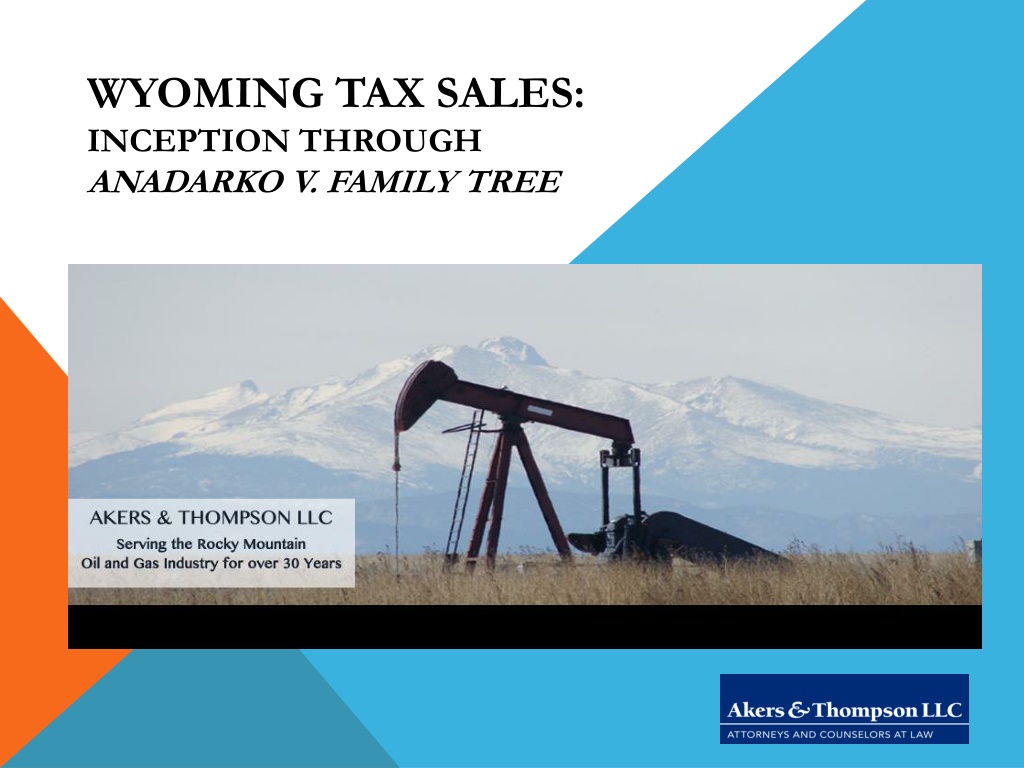
 undefined
undefined











